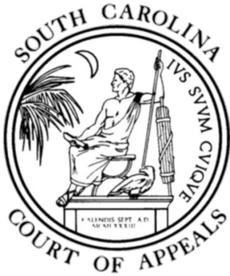South Carolina Court of Appeals
| South Carolina Court of Appeals | |
|---|---|
 |
|
| Established | 1 September 1983 |
| Country |
|
| Location | Columbia |
| Motto | "IUS SUUM CUIQUE" |
| Composition method | Election by the General Assembly |
| Authorized by | S.C. Const. art. V, § 7 |
| Decisions are appealed to | Supreme Court of South Carolina |
| Judge term length | Six years, staggered |
| No. of positions | 9 |
| Website | Court of Appeals |
| Chief Judge | |
| Currently | James E. Lockemy |
| Since | May 2016 |
The South Carolina Court of Appeals is the intermediate-level appellate court for the state of South Carolina.
The Court of Appeals hears most appeals from the Circuit Courts and Family Courts of South Carolina that do not fall within the seven classes of cases over which the South Carolina Supreme Court exercises exclusive jurisdiction. Those seven classes are cases involving
The modern incarnation of the court began operations in 1983, but had historical antecedents dating back to colonial times. In 1721, the General Court of the colonial government was given appellate jurisdiction over civil case decisions from the lower courts of the colony, but there were no separate appellate courts. The original South Carolina Constitution of 1790 made provisions for trial court judges to meet at the end of a term to decide on such matters as motions for new trials and other related matters. This practice was formalized by statute in 1799, when the South Carolina General Assembly created an appellate body of state circuit judges known as the "Constitutional Court", and provided for the writ of error to be used.
The General Assembly created a Court of Equity in 1808, but this also proved to be unsatisfactory to the administration of justice, primarily because in many cases, the trial judge also sat on the appellate body. The General Assembly responded by creating the first Court of Appeals in 1824, which consisted of three judges and had appellate jurisdiction in cases of law and equity. The Court was not an intermediate appellate body as the modern Court is, but a court of last resort that functioned similarly to the Constitutional Court.
Unfortunately, this Court of Appeals would become a casualty of the Nullification Crisis. The pro-nullification General Assembly, in its zeal to nullify the Tariff of 1828 and support of state supremacy, passed legislation mandating that officers in the State Militia recite a "test oath" swearing allegiance to South Carolina rather than the federal government. One state militia officer, M'Cready, refused to recite the oath, and was thus denied his commission. M'Cready petitioned the state trial court for a writ of mandamus compelling the commander to grant him his commission. After the trial court denied his petition, M'Cready sought appellate review before the Court of Appeals. The case of M'Cready v. Hunt came before the Court of Appeals in 1834, and the Court reversed the lower court's opinion by a vote of 2 to 1, declaring the oath unconstitutional.
...
Wikipedia
